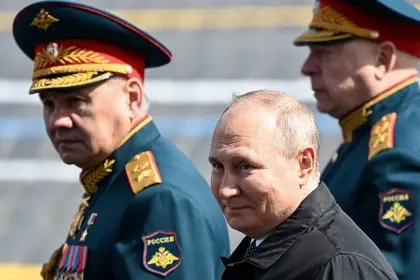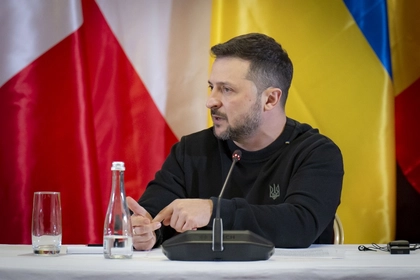Russia’s repeated allegations that Ukraine is planning to use biological weapons or “dirty bombs” that spread radioactive material are becoming increasingly implausible. Photos of plastic bags containing radioactive materials which were presented as proof of Ukraine’s intentions have been exposed by the Slovenian foreign ministry as originating from Slovenia. Nevertheless, the situation remains precarious according to commentators.
Today, Europe’s press debates the ongoing Russian invasion of Ukraine. Here are some opinions from a selection of European publications, presented by eurotopics.
JOIN US ON TELEGRAM
Follow our coverage of the war on the @Kyivpost_official.
The stakes are getting higher
Radio Kommersant FM sees the danger of things spiralling out of control even without nuclear bombs actually being deployed:
“So far our former Western partners have refused to accept the Russian version of events. … For the time being none of the parties is willing to react in an appropriate way. The second key aspect is that the nuclear issue is now firmly on the agenda. Nato is carrying out exercises – and the Russian response has now followed. The parties accuse each other of nuclear escalation. The stakes are getting higher, and even this is becoming an accepted reality. As is well known, humans can get used to anything – even something like this.”
Just dirty tricks
The West has seen through the Kremlin’s strategy, writes publicist Luís Delgado in Visão:

Russia Planned Genocide Long Before Invasion: Kill Lists, Crematoriums, Mass Graves – HUR
“A ‘dirty bomb’ has no military value, and it would be absurd for Ukraine to use it against itself. … This Russian invention, spread by the media and invoked in telephone conversations, fits perfectly into the script of the Kremlin’s dirty tricks. Putin can order the detonation of a ‘dirty bomb’ that can’t be detected by American satellites and then rush to deploy his nuclear arsenal.”
Complex diversionary tactics
Former Ukrainian foreign minister Pavlo Klimkin writes on Gordonua.com:
“Firstly, Moscow wants to divert attention from the attacks on our critical infrastructure and force everyone to talk about its lies. Secondly, the calls create the possibility of resuming communication with the West. … Thirdly, the Kremlin also has an eye on its domestic audience – propaganda still works in Russia, but people are becoming increasingly sceptical about the regime’s actions. Ultimately, however, it may also be that Russia is already working on ‘reasons’ to attack other Ukrainian nuclear power plants. … The logic is simple and genocidal: they want to take away our energy production and cause the electricity system to collapse over the winter.”
Putting the blackmailer in his place
Putin’s fear-mongering is rapidly losing its impact, the Aargauer Zeitung writes:
“Not only is the nuclear threat an empty one on closer inspection, but Putin is also on the verge of losing the energy war. Yes, prices are still high and costing Europe a lot of money. But that’s the market, and it’s working against Russia. Tankers are piling up off the coast of Spain and Portugal filled with liquefied gas from America and all over the world. Gas levels at storage facilities are approaching 100 percent, while populations and the economy are cutting down on consumption. And with mild temperatures, even autumn seems to want to do its bit towards putting the blackmailer in the Kremlin in his place.”
Aiming to wear down unity and commitment
The Spectator examines what Moscow could be up to with its accusation:
“The inevitable fear is that they are setting the scene for their own use of such a weapon, which they will blame on Kyiv. … Putin seems to have realised that his only real hope of victory is to be found in holding the line long enough for the West to lose unity and commitment to the war. To this end, anything that reinforces the message that he is sufficiently unhinged to escalate the war in disastrous new ways perversely helps his case. Assuming nothing comes of this latest story, we can expect a continuing stream of lurid claims and strikingly little supporting evidence.”
A test for the international community
The West must remain steadfast, Rzeczpospolita urges:
“Shoigu is sending a signal to the West: If you don’t stop the Ukrainian offensive and if you continue supplying weapons we will use all possible means, including the dirtiest. Moscow is preparing its own citizens for a worst-case scenario and testing the reaction of the international community. And if the Kremlin is convinced that the world powers will not react symmetrically, Putin will use the worst weapons on the Dnieper. It’s only a matter of time.”
Everything is becoming a weapon
Le Quotidien deplores the fact that humanity is abusing its creativity to invent ever new weapons:
“The human mind knows no bounds when it comes to destroying itself as quickly as possible – and without it being too expensive. … Social networks are no longer places to relax but propaganda tools, and harmless recreational objects [such as drones] can surprise and kill an enemy 25 km away. Everything is becoming a weapon. How far will this go? With these new devices and tools, war has already changed. The future does not look good.”
You can also highlight the text and press Ctrl + Enter






